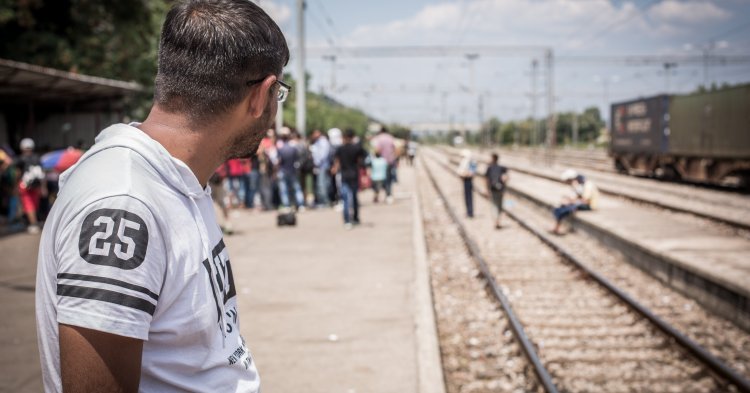A task of historical proportions

Marcel Wollscheid - Editor-in-Chief of treffpunkteuropa.de
“The EU migration commissioner Avramopoulos calls the current influx of refugees the “biggest refugee crisis since 1945”. 60 million people around the world are fleeing from their homelands. 800.000 asylum seekers are expected to arrive in Germany this year alone. According to the EU Commission, for the first time more than 100.000 people crossed the European borders to seek asylum in July 2015. These numbers can not even adequately describe the challenges that all political levels within the European Union are facing. The local communities are forced to find quick and pragmatic solutions to provide appropriate accommodations for refugees. Likewise, they have the task to integrate new residents, which will not come without conflicts. The member states should develop coherent approaches to harmonize their asylum und refugee policies. Without common ground in legislation towards non EU member-states, the free borders of Schengen within the EU will not be sustainable in the long term. Meanwhile, the Commission is dependent on the goodwill of the member states to enforce its Migration agenda. Recent experience shows that the Dublin-System in its current form has no future. Therefore, a fair allocation system for asylum seekers within Europe is a political necessity. It will be a litmus test for a pan-European concept facing the refugee crisis.”
Welcoming migrants, the only way

Hervé Moritz - Editor-in-Chief of Le Taurillon
"Migrants, who arrived on our coasts or through Eastern Europe, are mainly refugees from Syria or Iraq, from Afghanistan or Eritrea, who flee war and persecutions, terrorism and misery of conflicts. Since January 2015, 350 000 migrants are arrived on the territory of the European Union. Conflicts worsen in peripheral regions, number of refugees grows.
They have nothing to lose. Don’t imagine a shameful wall in Hungary, a classification of migrants according to their religion, their race or their origins, an intensified surveillance, police cordons at borders or in railway stations, we can stop people, who fight for their survival. Don’t give money to agencies for security; give money to organisations of welcoming and helping. We should create legal ways of immigration from neighbour countries of instable zones; administrate asylum applications together in European reception centers on the continent or in embassies abroad. We need these ways to stop shipwrecks and break illegal traffic of migrants and human trade. After their transit and having their refugee status, we should organise with associations their welcoming, their accommodation, their integration in our societies, and divide them up between Member States according to fair criteria.
It is a duty, it is also a chance. It is a duty, because Human Rights, human dignity and human life are essence of European Union. If we fail in front of this humanitarian challenge, Europe will never be Europe again. It is also a chance, because of the demographic decline of Europe. We need young populations to preserve our systems of society. It is an opportunity to rise to the challenge together for the future of Europe."
Inaction in the face of a humanitarian tragedy
Simone Corvatta - Editor-in-Chief of El Nuevo Federalista
“The humanitarian drama is increasingly becoming a political issue and the subject of internal political confrontations. Basically, the question of immigration has always been the central point and the relevant element of national and extremist forces. The image of the mass of foreigners designated by local destructive forces since time immemorial as a”swarm of bees" or invasion of the homeland, which is coming from far away, to steal jobs, resources and rights to the people that are currently there. Such a view of migration is an ever-present and influential part of people’s social psychology, which is why the one who presents their self as a defender against this invasion of the desperate, is easily approved of as a political force on the European and national scene.
On the other hand the moderate forces only reluctantly take a clear position to confront these representations because they cannot afford to tackle the problem from a national perspective. To develop a solution that enables a policy of integration, are endangered by the accompanying presupposed renunciation of national sovereignty because of unpopular decisions to lose political influence. The consequence is inaction, while humanitarian tragedy is one of an increasing number of victims.
This situation manifests itself as a game of extremist forces that present themselves at the same time as a defender of national borders and as the saviour of thousands of lives. In this party game questions of humanity are left completely sidelined and a refugee is not considered to be man, woman or child, who are looking for a dignified life, but merely abused as a useful propaganda tool."
The battle for populism:

Christopher Powers - Managing Editor of The New Federalist
Europe has shown yet again that racism and nationalism are pernicious forces that still linger, like a tumour, at the core of 21st century society. Terrible crises unimaginable to most Europeans have gripped our neighbourhood from Murmansk, down to the red sea, and across to the Atlantic coast. Our response to these has not been solidarity for the cause of basic human rights but rather it has been the aggressive reassertion of narrow-minded and national self-interest. Poland, a country who sent thousands of migrants across the EU upon accession, turned its back on the plight of burden sharing. The UK’s response to the deprived conditions at Calais has been to build stronger fences and toy with the idea of using force. Viktor Órban has promised to build a wall rather than the bridges between people in that region that are sorely needed. Smaller states (in and out of the EU) like Greece, Macedonia, and Serbia cannot handle the influx alone. In short, we have a shambles, and one that could easily be tidied up were we willing to fix this crisis in a federalist way, as we all know and appreciate.
It is important to remember though that even in the darkest of times, there are good people doing good things out there. In the UK, the group Folkestone United has taken a grassroots approach to helping at the Channel crossing. In Hungary, a ‘Battle of the Billboards’ is taking place with the government’s anti-migration messages being contested by witticisms from grassroots members of the public. Engaging the people is not something that evildoers have a monopoly on. It is our hope as TNF Editors that our coverage of this issue will be able to become more positive in the next few weeks and months.









Follow the comments: |
|
